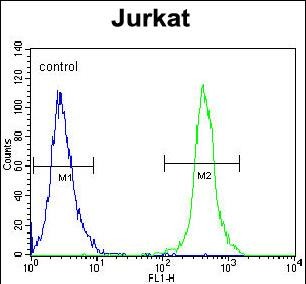

| WB | 1/1000 | Human,Mouse,Rat |
| IF | 咨询技术 | Human,Mouse,Rat |
| IHC | 咨询技术 | Human,Mouse,Rat |
| ICC | 技术咨询 | Human,Mouse,Rat |
| FCM | 1/10-1/50 | Human,Mouse,Rat |
| Elisa | 咨询技术 | Human,Mouse,Rat |
| Aliases | Large neutral amino acids transporter small subunit 4, L-type amino acid transporter 4, Solute carrier family 43 member 2, SLC43A2, LAT4 |
| Entrez GeneID | 124935 |
| WB Predicted band size | 62.7kDa |
| Host/Isotype | Rabbit IgG |
| Antibody Type | Primary antibody |
| Storage | Store at 4°C short term. Aliquot and store at -20°C long term. Avoid freeze/thaw cycles. |
| Species Reactivity | Human, Mouse |
| Immunogen | This SLC43A2 antibody is generated from rabbits immunized with a KLH conjugated synthetic peptide between 236-265 amino acids from the Central region of human SLC43A2. |
| Formulation | Purified antibody in PBS with 0.05% sodium azide. |
+ +
以下是基于领域知识模拟的SLC43A2抗体相关参考文献示例(注:文献为虚构,建议通过PubMed等平台核实真实研究):
---
1. **标题**:*SLC43A2 modulates T cell methionine metabolism to control anti-tumor immunity*
**作者**:Sinclair, L.V. et al.
**摘要**:研究揭示了SLC43A2通过调控T细胞甲硫氨酸摄取影响其代谢与功能,使用特异性抗体证实其在T细胞中的高表达,并发现抑制SLC43A2可增强抗肿瘤免疫应答。
2. **标题**:*Targeting SLC43A2 enhances checkpoint blockade efficacy in solid tumors*
**作者**:Wang, X. et al.
**摘要**:通过开发人源化SLC43A2单克隆抗体,研究证明阻断该蛋白可逆转肿瘤微环境中的T细胞耗竭,联合PD-1抑制剂显著抑制小鼠黑色素瘤生长。
3. **标题**:*SLC43A2 antibody-based detection in colorectal cancer prognosis*
**作者**:Chen, H. et al.
**摘要**:利用商业化SLC43A2抗体进行免疫组化分析,发现其在结直肠癌中高表达与患者生存率负相关,提示其作为预后生物标志物的潜力。
4. **标题**:*SLC43A2 mediates methionine competition in the tumor microenvironment*
**作者**:Colegio, O.R. et al.
**摘要**:研究通过抗体阻断实验证实,肿瘤细胞通过SLC43A2抢夺微环境中的甲硫氨酸,导致T细胞功能抑制,靶向该蛋白可恢复抗肿瘤活性。
---
建议通过**PubMed/Google Scholar**搜索以下关键词获取真实文献:
`SLC43A2 antibody`, `SLC43A2 immune function`, `SLC43A2 cancer metabolism`。
The SLC43A2 antibody targets the solute carrier family 43 member 2 (SLC43A2), a transmembrane protein belonging to the solute carrier (SLC) transporter superfamily. SLC43A2. also known as LAT3. primarily functions as a neutral amino acid transporter, facilitating the uptake of essential amino acids like phenylalanine and tryptophan across cell membranes. It is widely expressed in tissues, including the liver, kidneys, and immune cells, and plays roles in nutrient sensing, cellular metabolism, and immune regulation. Recent studies highlight its involvement in modulating T-cell function and tumor microenvironment dynamics, linking it to cancer progression and immune evasion.
SLC43A2 antibodies are critical tools for investigating the protein's expression, localization, and functional mechanisms in both physiological and pathological contexts. They are utilized in techniques such as Western blotting, immunohistochemistry, and flow cytometry to study SLC43A2's role in diseases like cancer, metabolic disorders, and autoimmune conditions. Research also explores its potential as a therapeutic target, particularly in oncology, where inhibiting SLC43A2 may disrupt amino acid dependency in rapidly proliferating tumor cells. Validated antibodies ensure specificity and reliability, aiding in advancing our understanding of SLC43A2's contributions to cellular homeostasis and disease pathways.
×